The navy of the People’s Liberation Army is now larger than that of the United States. Particularly in the Indo-Pacific, China is continuously expanding its influence, even with high-tech weaponry that rivals US military technology. The USA, on the other hand, relies increasingly on military alliances in the region, especially with South Korea, Japan and Australia.
Tensions over Taiwan now make war between the two great powers more plausible than it was five years ago, says Felix Heiduk, Asia research group leader at the SWP in an interview with Gabriel Bub of Table.Media. The biggest risk in his view: In the Indo-Pacific, there are still no strategies and institutions for conflict resolution, “from arms control to the diplomatic level”. That means conflict management is still dependent on the personal relationships of the ruling elites, explains Heiduk. And depending on the political and economic climate, they cannot reliably keep the peace.
The current visit of the German liberal FDP delegation to Taiwan also holds escalation potential. At least, that is how the Chinese Embassy in Berlin sees it. It warned German politicians not to “play with fire” or, alternatively, to “pour oil on the fire”. Such fiery metaphors are, of course, purely routine.
The FDP parliamentary group wants its trip to be perceived as a “gesture of solidarity” with a focus on security policy, as our author David Demes reports from Taiwan. In the face of the Ukraine war, military aggression must be confronted with a firm stance. Nevertheless, the One-China policy is not to be called into question, explains party deputy Johannes Vogel.
In the spring, another high-ranking FDP party member, Federal Minister of Education Bettina Stark-Watzinger, plans to visit Taiwan. It would be the first visit to Taiwan by a member of the German government in 26 years. We will see what flaming sword of indignation Beijing will then brandish.


Mr. Heiduk, are we heading for war in the Indo-Pacific?
Depending on the definition, the Indo-Pacific extends at least from the western Pacific island groups to the east coast of Africa. What do you mean exactly? A war between the USA and China?
That is what I was getting at.
I think a war happening is more plausible now than it was five or ten years ago – I would always argue along plausibilities. But the outbreak and course of wars are usually so multicausal that serious social science should always emphasize that it is almost impossible to predict them.
What plausibilities make war more likely?
First, there is the increasing regulatory rivalry. Beijing actively challenges the established US supremacy in the region – politically, economically, but also increasingly militarily. Moreover, a perception of bilateral relations between Washington and Beijing has spread domestically, both in China and in the United States, that sees them as an antagonistic zero-sum game.
In addition, conflict management instruments are largely lacking in the region. From the level of arms control to the diplomatic level. None of this has been institutionalized at all-and, and truth be told, conflict management is therefore dependent on the personal relationships between the ruling elites.
What is the lack of arms control doing to the region?
There are a number of security hotspots where the tense security situation could trigger spirals of military escalation as a result of the ever-increasing militarization of the region – and this may well be unintended, that means even if the two central actors, Washington and Beijing, have no interest in it. Moreover, it has a reinforcing effect on the growing mistrust between the United States and Beijing about each other’s “true” intentions.
How has China armed itself in the Indo-Pacific?
Especially, but not exclusively, in the naval sector. First of all, it can be understood in purely quantitative terms: The Chinese navy is now larger in number than that of the USA. But armament is not limited to the People’s Liberation Army only. By that, I mean not just the navy as a navy, but also the military gray area, which ranges from the coast guard to civilian fisheries. There is a lot of research that shows that the larger fishing fleets in recent years have always operated in conjunction with the Coast Guard and Navy.
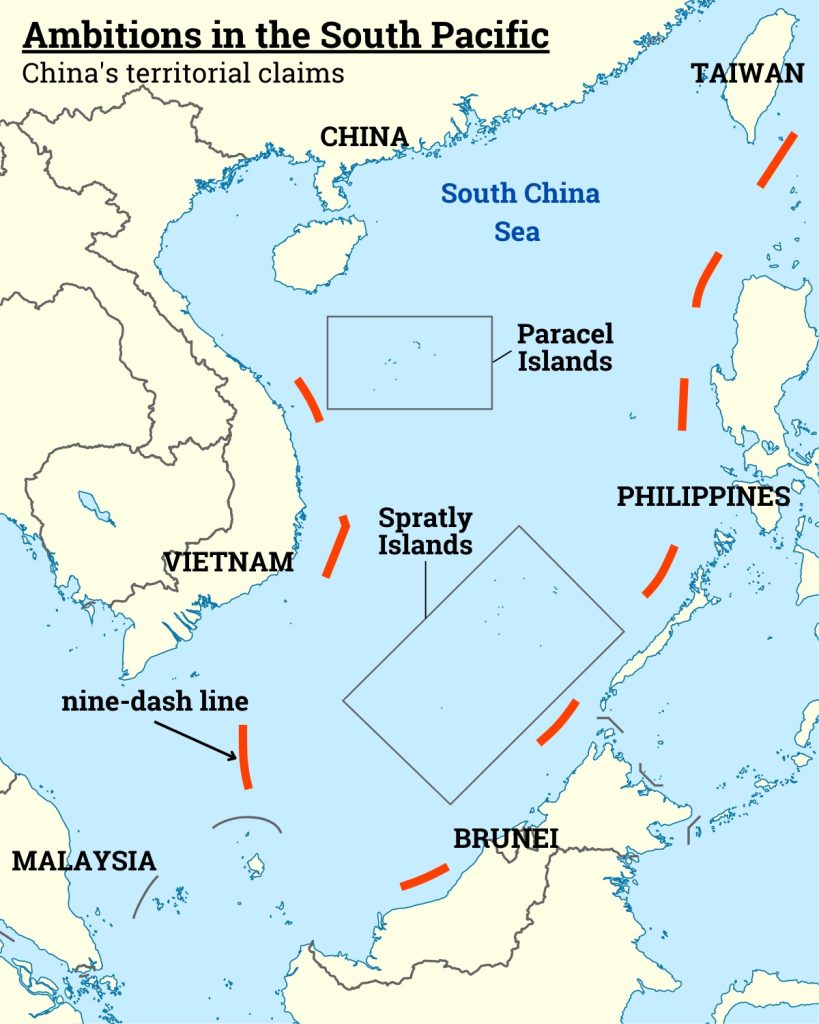
And that civilian ships are also used by the government to enforce territorial claims, for example against the Philippines or Vietnam. Certain ships of the Chinese coast guard are now well-armed and even larger than corvettes and frigates. However, this does not appear at all in the normal military budget.
Is China’s navy also of better quality than that of the US?
Frankly, that’s hard to measure. As sad as it sounds – that would probably have to be found out in combat. How the US deals with this uncertainty is, of course, an interesting question.
And how do they deal with that?
If we look at the rhetoric, we would assume that there is a massive expansion of US military capabilities in the Indo-Pacific. But so far we have not been able to show this empirically.
There is no strong American arms buildup?
No, interestingly enough, not in the Indo-Pacific. But what does exist – the keyword is integrated deterrence – is a concept that says: We as the USA are not willing to further expand our already extensive military capabilities on our own, but we see the need to increase military deterrence against China.
What does that mean?
Integrated deterrence means we have five bilateral military alliances. There is a hub-and-spoke system, with the USA as the hub and the five allies as the spokes. What the US is not willing or able to invest in its own military capacities is to be expanded at the spokes. That means the spokes, particularly South Korea, Japan and Australia, to a lesser extent the Philippines, and you can put a bigger question mark over Thailand at the moment. But at least the first three are expected to massively expand their own military capabilities and cooperate more with each other and with the US – to take some of the burden off the US in this regard while increasing military deterrence against China. China is catching up in defense spending. Not everything that goes into naval forces shows up here.
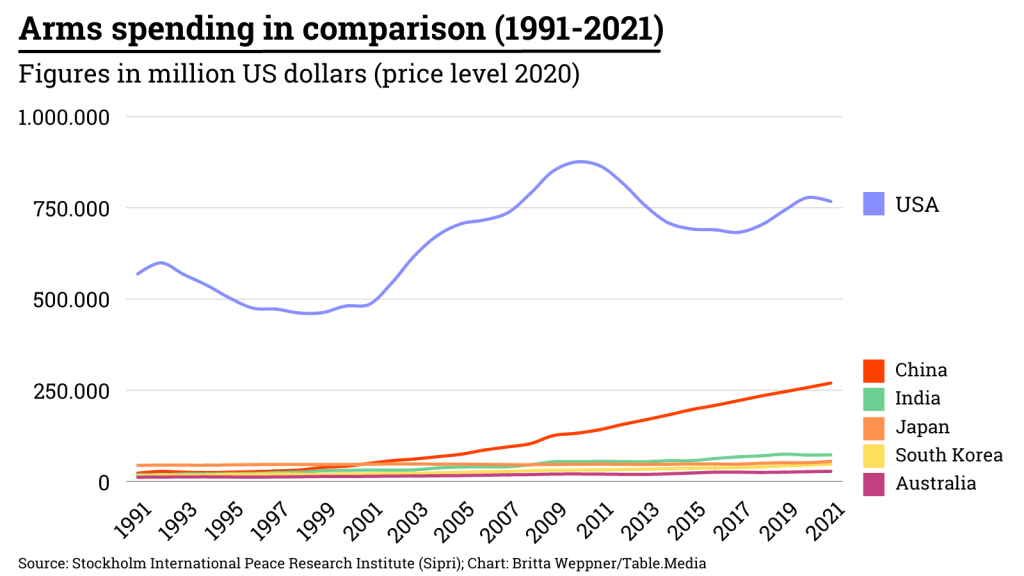
Is there a Chinese counter-model to this?
So far, I am not aware of any official strategic counterplan. It could be argued whether the partnership with Pakistan or Cambodia or with Laos is a quasi-alliance. The fact is, China has not made any alliances since Korea. We do not currently see a Chinese-dominated alliance system rivaling that of the United States. But we do see the intensification of bilateral partnerships between China and partner countries in the region, including in the military area.
What security architecture would be in Europe’s interest?
When I look at the official debates and strategies on this, it is relatively clear that a Sino-American bipolarity of any kind and corresponding regional security architecture is not desired. There is talk of effective multilateralism, of inclusiveness in the Indo-Pacific.
If we look at the observable behavior of Germany, France and others, however, we see that their security policy behavior does not fit the narrative. For this, the Europeans would have to actively approach China in order to integrate the People’s Republic into any kind of inclusive, multilateral security policy structures. However, this is not observable. Nor can it be observed that the PRC is currently interested in such cooperation.
What kind of order is then emerging in the Indo-Pacific?
There are increasingly players such as India, Indonesia, Australia, Japan, whose importance in security and defense policy is growing. In my view, what can be derived from this is a multipolar order in this region. I recently attended a conference in Jakarta, where there were positive connotations of a system of order that does not represent the bipolar system of a new Cold War and thus offers states such as India, Indonesia and other middle powers more opportunities to exert influence.
In any case, it is likely to be a clearly asymmetric multipolarity at first, because China and the USA are the big guys and will remain so for the foreseeable future. Whether this means a stable order in terms of security policy, I would put a big question mark over it for the time being. Perhaps then we would all like to see a new Cold War, which we have not yet had in the Indo-Pacific.
Felix Heiduk is head of the Asia Research Group at the German Institute for International and Security Affairs (SWP) in Berlin. The foundation advises the Bundestag and the German government on all foreign and security policy issues. His areas of expertise include security and foreign policy in Southeast Asia.
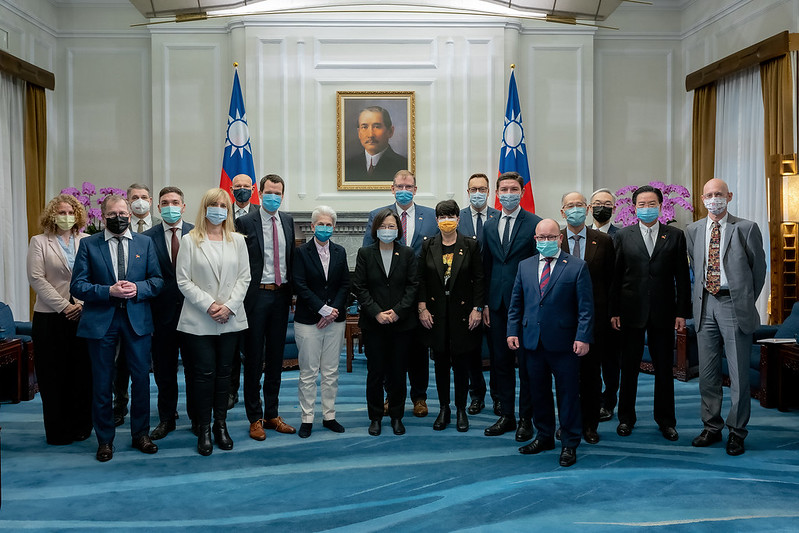
If you stroll through one of Taipei’s famous night markets these days, chances are that you will run into a member of the German Bundestag. The democratic island republic is currently very popular with German parliamentarians. Since Monday, the third Bundestag delegation in just three months has been to Taiwan.
During their four-day stay, the ten-member group of the liberal FDP parliamentary group, led by Marie-Agnes Strack-Zimmermann and Johannes Vogel (China.Table reported), will primarily focus on security and defense policy matters, in addition to semiconductors and human rights.
At a reception at the Presidential Office in Taipei on Tuesday, the delegation met with President Tsai Ing-wen. In her welcoming remarks, co-delegation leader Strack-Zimmermann focused on the war in Ukraine as the reason for her visit. “February 24 changed everything … this attack was a wake-up call not only for Europe, but for the whole world,” the chairwoman of the defense committee said.
On the first day of their visit, the delegates met with Taiwan’s Prime Minister Su Tseng-chang (蘇貞昌) and Defense Minister Chiu Kuo-cheng (邱國正). The delegation will also stop at the Ministry of Defense and the government’s own defense think tank INDSR (Institute for National Defense and Security Research).
On behalf of the Taiwanese people, President Tsai expressed her gratitude for Germany’s support. In her welcoming speech, she referred to the recently announced reform of Taiwan’s military service and expressed the expectation that democratic states should cooperate even more closely to counter the spread of authoritarianism and jointly defend values like freedom and democracy. “We look forward to Taiwan, Germany and other democratic partners jointly maintaining the regional order and prosperity,” Tsai said.
FDP Vice Chairman Johannes Vogel reiterated that the German government and all Western partners supported the One-China policy. However, he also stressed that any forcible change of the status quo in the Taiwan Strait and even the threat of force was unacceptable. “Our visit here is also a gesture of support and solidarity against any threatening of military force,” Vogel said. China again simulated an attack on the island on Sunday, with 28 aircraft crossing the median line of the Taiwan Strait.
In an interview with China.Table on Monday, Vogel called on the West to position itself in a way that would also make war unlikely through deterrence. Experts agree with him. “The fact that Johannes Vogel is focusing on the concept of deterrence in light of the dispute between China and Taiwan is exactly right,” Thorsten Benner of the Global Public Policy Institute told China.Table. Benner sees the trip as an important signal of increased exchange between German parliamentarians and Taiwan. However, the decisive German contribution to deterrence must be primarily non-military, the political scientist says. The goal is to work together with allies to show Beijing the technological and economic costs of an attack on Taiwan.
The Chinese Embassy in Berlin reacted with the usual anger to the visit and, in a lengthy statement, accused the MPs of “adding fuel to the fire”. However, China observer Benner believes precisely this reaction underscores the significance of the FDP’s trip. The fact that the Chinese Embassy devoted a press release to it was a sign that Beijing was taking the efforts of the exchange with Taiwan within the One-China policy seriously. The One-China policy certainly leaves room for this.
Strack-Zimmermann and Vogel rejected criticism of their trip in an Instagram Live post on Wednesday evening. They did not want to provoke, but to show a firm stance, Strack-Zimmermann said. Johannes Vogel was even more explicit, saying the real provocateur was Xi Jinping. “As a free world, we have to show that we will not accept this aggression and border shifting from Beijing’s side.” One acquiesces to Beijing’s logic if one accepts the interpretation as provocation, Vogel said in the video.
Before their departure on Thursday evening, the MPs will meet with representatives of the opposition Kuomintang (KMT) party.
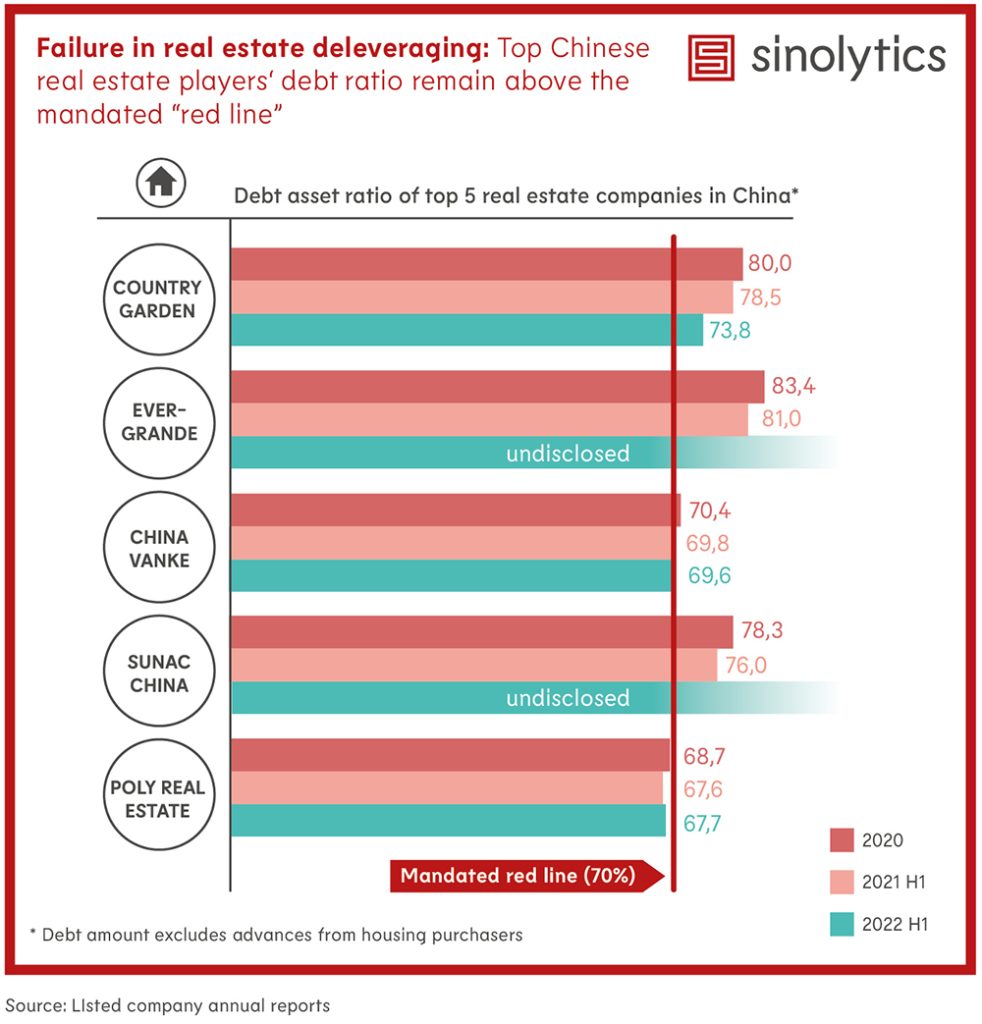
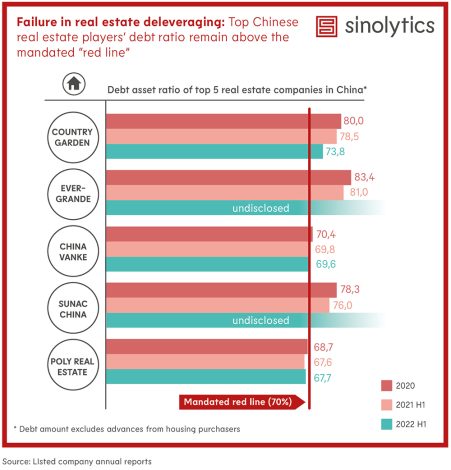
Sinolytics is a European research-based consultancy entirely focused on China. It advises European companies on their strategic orientation and concrete business activities in the People’s Republic.
China will no longer issue visas in South Korea and Japan. This is the Chinese authorities’ reaction to the tightened entry regulations introduced by Japan, South Korea and other countries due to a rise in Covid infections in China. According to the Chinese Embassy, it stopped issuing short-stay visas to travelers from South Korea for the time being on Tuesday. In Japan, Kyodo news agency reported, citing the travel sector, that Beijing informed travel agencies that it would no longer issue China visas to travelers from Japan.
Although China itself requires similar testing of all travelers, Foreign Ministry spokesman Wang Wenbin in Beijing called corresponding measures by other countries “discriminatory.” According to Chinese state media, Covid infections in China have already passed their peak. New infections were declining in the capital Beijing and several provinces, reported Health Times, a publication of the People’s Daily, the newspaper of the Chinese Communist Party. rtr/fpe
China’s steel output in 2022 fell 2.2 percent year-on-year to about 1.01 billion tons. The economic slowdown and the ongoing slump in the real estate sector have curbed demand, the business magazine Caixin reported Tuesday, citing Qu Xiuli, Vice Chairman of the China Iron and Steel Association (CISA). Steel prices fell due to weak demand, the paper said, adding that the average value of CISA’s price index fell 13.6 percent year-on-year from January to November. This squeezed profit margins amid persistently high raw material prices. The combined net profit of CISA members slumped 72.5 percent to 98.3 billion yuan, Qu said at an industry event.
Qu predicted that domestic demand would increase in 2023 after China abandoned its strict Covid measures and efforts to revive the real estate market will unfold. However, Li Ganpo, Chairman of steelmaker Jingye Group, warned at the same event that China’s steel industry was entering a long-term downturn and recovery was not expected for another five years. The downturn will encourage industry restructuring with more mergers and acquisitions, Li said. ck
President Xi Jinping has warned China’s cadres and other officials against collusion with the business world. “Action should be taken to prevent leading officials from acting for any interest group or power group, and to forestall any collusion between officials and businesspeople,” Xi said on Monday at a meeting with anti-corruption officials, the official Xinhua news agency reported. He also reportedly warned against “any infiltration of capital into politics that undermines the political ecosystem or the environment for economic development.”
Xi thus made it clear that the party will continue to target the private sector. The fight against corruption has been one of Xi’s priorities since the beginning of his term in office a good ten years ago. Beijing has also tightened its control over the private sector under Xi. For example, the authorities are cracking down on the tech sector and individual entrepreneurs. This is how Xi just recently pressured Alibaba founder Jack Ma out of his company’s business (China.Table reported). On the very day of Jack Ma’s withdrawal, central bank chief Guo Shuqing, who also heads the banking regulator, announced that the tech crackdown was “basically” over. “Next, we’ll promote healthy development of internet platforms,” Guo said, according to Xinhua. ck
Tiktok CEO Shou Zi Chew has met high-ranking EU officials and campaigned for more trust in the company. The talks between the TikTok CEO and EU Competition Commissioner Margrethe Vestager in Brussels included detailed plans on how the Chinese video app is preparing for new liability and security rules for digital platforms (the so-called Digital Services Act) that will take effect in 2024. The meeting with Chew on Tuesday in Brussels was productive, Europe.Table learned from Commission sources. All problems were directly addressed and discussed. The impression was that TikTok was preparing more diligently for the new legal situation than some of its US competitors.
But for TikTok, it is also a matter of economic survival. One or two more mistakes – such as the recently revealed spy attempt on US journalists – and TikTok faces a ban in the US and EU. Because of reports of “aggressive data collection and surveillance in the US,” the EU’s General Data Protection Regulation and privacy issues were also discussed, Vestager’s official statement said after the meeting.
Whether TikTok will ultimately manage to fulfill all of its promises, however, is an open question, according to Commission sources. In addition to Vestager, Chew also met with other EU commissioners. Věra Jourová, Commissioner for Values and Transparency, asked about the safety of children on the platform, among other things. Other topics included the spread of Russian disinformation on TikTok and the transparency of paid political content. There should be no doubt that users’ data is safe in Europe and not exposed to illegal access by authorities from non-EU countries, Jourová said after the conversation. vis
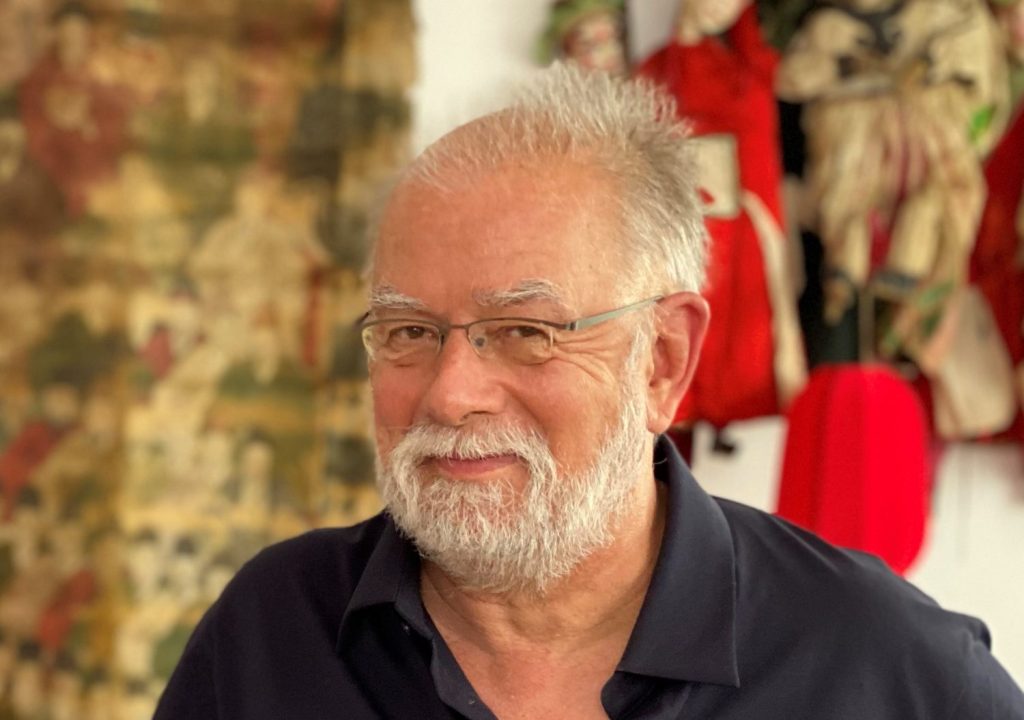
Without Hartmut Heine, there would be no Transrapid in China. As head of Thyssenkrupp, he brought Chinese politicians and German industry together around the turn of the millennium, negotiated the contract and managed the construction of the system on the German side. On New Year’s Eve 2002, the maglev train took off for its maiden trip to Shanghai’s Pudong Airport. Aboard: Then German Chancellor Gerhard Schroeder and China’s Premier Zhu Rongji. Hartmut Heine was the real Mister Transrapid. As has only just become known, he died of a heart attack in Beijing on December 4 at the age of 68.
Heine lived and worked in China for more than 40 years – among others for Salzgitter Stahl, Thyssenkrupp AG, Siemens and Georgsmarienhuette GmbH. Heine co-founded the German Chamber of Commerce in 1984 and served on the board of the German School Beijing for more than a decade. With his yellow Porsche Carrera Cabrio, he was well-known around Beijing at a time when there were not many Porsches around yet.
Heine had worked his way up, from shift worker at Kellogg’s Cornflakes in Bremen and cable carrier in the Beat Club for Jimi Hendrix, to business graduate and finally to one of the most important China specialists in German industry. Most recently, he represented Hardt, the Dutch-based leading European hyperloop manufacturer, in Beijing. Heine’s big hope: A joint European-Chinese Hyperloop, a kind of Transrapid 2.0 that travels in a vacuum tube that rivals the speed of airplanes.
Yet the Transrapid project has been long industrial history, both in China and in Germany. Even Heine could not imagine that this project would ever be resurrected. But climate change has prompted the world, and China in particular, to push again for the potentially more energy-efficient Hyperloop project. “The Chinese have the most pressure to act,” he said in an interview. Heine had seen it happen more than once in his decades in China that pressure to act leads to tangible results that can change China and the world.
The fact that such developments are much slower, not only in Germany but in the West in general, was something that always bothered Heine, and even made him impatient. A Transrapid project in the USA, which he helped negotiate, simply fell through because of the time it took to negotiate the purchase of the land. Such a thing would not have happened in China. China had the speed, the West the technological depth – “still,” he often added. “Only together are we strong,” was his credo. He had always dismissed the risks of technology theft: “Nothing is without risk, but the opportunities are greater than the dangers.”
Heine’s strategic instinct, which helped him to convince hesitant parties of the merits of new projects, was his great strength. He did not spend a lot of time dealing with resistance, but immediately explored the room for negotiations. In the process, he occasionally had to resort to a ruse. When the top executives of Thyssenkrupp had a hard time with the Transrapid project in Shanghai, Heine promptly announced in the press that the Chinese side had already decided to build the maglev train. When Thyssenkrupp’s share price soared as a result, it was clear even to the Group’s headquarters that they would not get out of this one. And Beijing was grateful that the Germans had now stepped up the pace. Heine was respected in China more than almost any other German for such moves, even though he sometimes did similar things the other way around with the Chinese.
Heine was fearless and willing to take risks, some say; Heine was self-indulgent and cocky, others say. Heine’s impatience was both a weakness and a strength. It did not lessen even with age. Retirement was not for him; he had to keep going. In addition to his work for Hyperloop, he imported German schnapps to China. He lived his career dreams to the very end.
For years, Hartmut Heine organized a traditional German dinner, with kale and sausages, complete with German folk music. Heine’s favorite pub was “Schindlers Anlegestelle” behind the German Embassy, where German food was served. Heine was a one-of-a-kind. He left at a time when German-Chinese relations would need someone like him more than ever. There is one thing Heine left us with: “We have to accept that the Chinese now have their own ideas and are implementing them more than ever. We have to understand what they want. Only then will we continue to play along.” Frank Sieren
Mario Roland Haessner has been promoted to Technical Director at Stulz GmbH in Shanghai. The company manufactures industrial machines in the field of air conditioning technology. Previously, Haessner served as Product Management Director at Stulz. He continues to hold a second position as Sales Support Director.
Andrea Baden has taken over the position of Head of Logistics Operations Services USA & China at Airbus. Baden has worked for the European aircraft manufacturer for more than five years, most recently as Supply Chain & Logistics Transformation Leader. She will continue to be based in Scheeßel in Lower Saxony.
Is something changing in your organization? Why not let us know at heads@table.media!
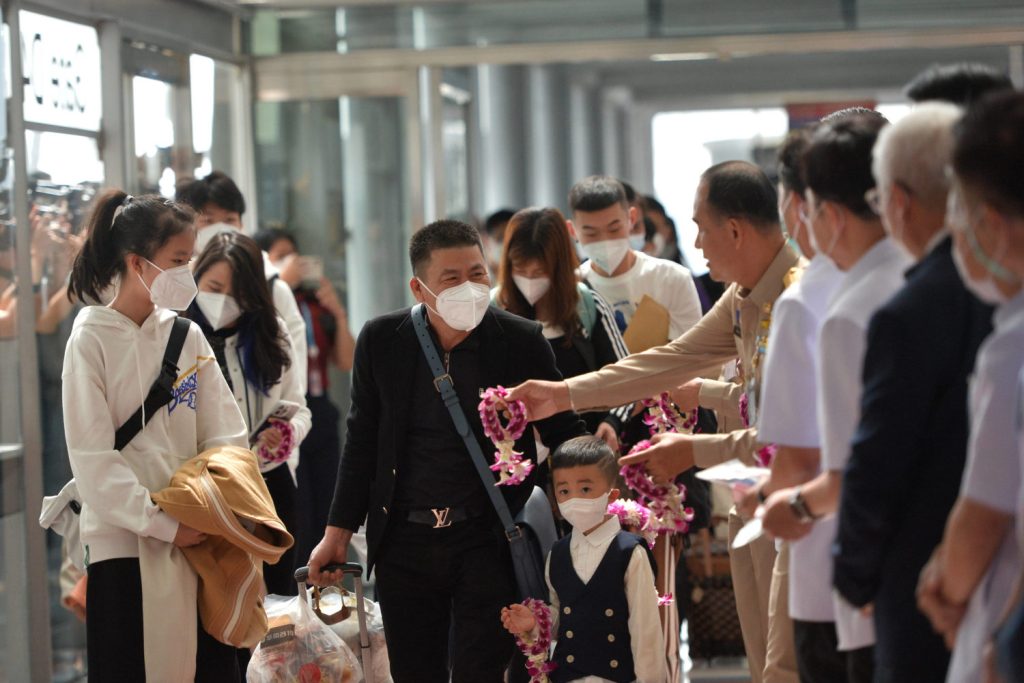
Long-awaited reunion: A group of Chinese tourists is euphorically welcomed with flower garlands at Bangkok-Suvarnabhumi Airport. Thailand, unlike many other countries, does currently not require Chinese travelers to take a negative Covid test. Thailand’s tourism authority hopes to welcome “at least five million” Chinese tourists this year. After the end of zero-Covid, however, only 15 flights a week are taking off for Thailand for the time being – before the pandemic, there had been around 400.
The navy of the People’s Liberation Army is now larger than that of the United States. Particularly in the Indo-Pacific, China is continuously expanding its influence, even with high-tech weaponry that rivals US military technology. The USA, on the other hand, relies increasingly on military alliances in the region, especially with South Korea, Japan and Australia.
Tensions over Taiwan now make war between the two great powers more plausible than it was five years ago, says Felix Heiduk, Asia research group leader at the SWP in an interview with Gabriel Bub of Table.Media. The biggest risk in his view: In the Indo-Pacific, there are still no strategies and institutions for conflict resolution, “from arms control to the diplomatic level”. That means conflict management is still dependent on the personal relationships of the ruling elites, explains Heiduk. And depending on the political and economic climate, they cannot reliably keep the peace.
The current visit of the German liberal FDP delegation to Taiwan also holds escalation potential. At least, that is how the Chinese Embassy in Berlin sees it. It warned German politicians not to “play with fire” or, alternatively, to “pour oil on the fire”. Such fiery metaphors are, of course, purely routine.
The FDP parliamentary group wants its trip to be perceived as a “gesture of solidarity” with a focus on security policy, as our author David Demes reports from Taiwan. In the face of the Ukraine war, military aggression must be confronted with a firm stance. Nevertheless, the One-China policy is not to be called into question, explains party deputy Johannes Vogel.
In the spring, another high-ranking FDP party member, Federal Minister of Education Bettina Stark-Watzinger, plans to visit Taiwan. It would be the first visit to Taiwan by a member of the German government in 26 years. We will see what flaming sword of indignation Beijing will then brandish.


Mr. Heiduk, are we heading for war in the Indo-Pacific?
Depending on the definition, the Indo-Pacific extends at least from the western Pacific island groups to the east coast of Africa. What do you mean exactly? A war between the USA and China?
That is what I was getting at.
I think a war happening is more plausible now than it was five or ten years ago – I would always argue along plausibilities. But the outbreak and course of wars are usually so multicausal that serious social science should always emphasize that it is almost impossible to predict them.
What plausibilities make war more likely?
First, there is the increasing regulatory rivalry. Beijing actively challenges the established US supremacy in the region – politically, economically, but also increasingly militarily. Moreover, a perception of bilateral relations between Washington and Beijing has spread domestically, both in China and in the United States, that sees them as an antagonistic zero-sum game.
In addition, conflict management instruments are largely lacking in the region. From the level of arms control to the diplomatic level. None of this has been institutionalized at all-and, and truth be told, conflict management is therefore dependent on the personal relationships between the ruling elites.
What is the lack of arms control doing to the region?
There are a number of security hotspots where the tense security situation could trigger spirals of military escalation as a result of the ever-increasing militarization of the region – and this may well be unintended, that means even if the two central actors, Washington and Beijing, have no interest in it. Moreover, it has a reinforcing effect on the growing mistrust between the United States and Beijing about each other’s “true” intentions.
How has China armed itself in the Indo-Pacific?
Especially, but not exclusively, in the naval sector. First of all, it can be understood in purely quantitative terms: The Chinese navy is now larger in number than that of the USA. But armament is not limited to the People’s Liberation Army only. By that, I mean not just the navy as a navy, but also the military gray area, which ranges from the coast guard to civilian fisheries. There is a lot of research that shows that the larger fishing fleets in recent years have always operated in conjunction with the Coast Guard and Navy.

And that civilian ships are also used by the government to enforce territorial claims, for example against the Philippines or Vietnam. Certain ships of the Chinese coast guard are now well-armed and even larger than corvettes and frigates. However, this does not appear at all in the normal military budget.
Is China’s navy also of better quality than that of the US?
Frankly, that’s hard to measure. As sad as it sounds – that would probably have to be found out in combat. How the US deals with this uncertainty is, of course, an interesting question.
And how do they deal with that?
If we look at the rhetoric, we would assume that there is a massive expansion of US military capabilities in the Indo-Pacific. But so far we have not been able to show this empirically.
There is no strong American arms buildup?
No, interestingly enough, not in the Indo-Pacific. But what does exist – the keyword is integrated deterrence – is a concept that says: We as the USA are not willing to further expand our already extensive military capabilities on our own, but we see the need to increase military deterrence against China.
What does that mean?
Integrated deterrence means we have five bilateral military alliances. There is a hub-and-spoke system, with the USA as the hub and the five allies as the spokes. What the US is not willing or able to invest in its own military capacities is to be expanded at the spokes. That means the spokes, particularly South Korea, Japan and Australia, to a lesser extent the Philippines, and you can put a bigger question mark over Thailand at the moment. But at least the first three are expected to massively expand their own military capabilities and cooperate more with each other and with the US – to take some of the burden off the US in this regard while increasing military deterrence against China. China is catching up in defense spending. Not everything that goes into naval forces shows up here.

Is there a Chinese counter-model to this?
So far, I am not aware of any official strategic counterplan. It could be argued whether the partnership with Pakistan or Cambodia or with Laos is a quasi-alliance. The fact is, China has not made any alliances since Korea. We do not currently see a Chinese-dominated alliance system rivaling that of the United States. But we do see the intensification of bilateral partnerships between China and partner countries in the region, including in the military area.
What security architecture would be in Europe’s interest?
When I look at the official debates and strategies on this, it is relatively clear that a Sino-American bipolarity of any kind and corresponding regional security architecture is not desired. There is talk of effective multilateralism, of inclusiveness in the Indo-Pacific.
If we look at the observable behavior of Germany, France and others, however, we see that their security policy behavior does not fit the narrative. For this, the Europeans would have to actively approach China in order to integrate the People’s Republic into any kind of inclusive, multilateral security policy structures. However, this is not observable. Nor can it be observed that the PRC is currently interested in such cooperation.
What kind of order is then emerging in the Indo-Pacific?
There are increasingly players such as India, Indonesia, Australia, Japan, whose importance in security and defense policy is growing. In my view, what can be derived from this is a multipolar order in this region. I recently attended a conference in Jakarta, where there were positive connotations of a system of order that does not represent the bipolar system of a new Cold War and thus offers states such as India, Indonesia and other middle powers more opportunities to exert influence.
In any case, it is likely to be a clearly asymmetric multipolarity at first, because China and the USA are the big guys and will remain so for the foreseeable future. Whether this means a stable order in terms of security policy, I would put a big question mark over it for the time being. Perhaps then we would all like to see a new Cold War, which we have not yet had in the Indo-Pacific.
Felix Heiduk is head of the Asia Research Group at the German Institute for International and Security Affairs (SWP) in Berlin. The foundation advises the Bundestag and the German government on all foreign and security policy issues. His areas of expertise include security and foreign policy in Southeast Asia.

If you stroll through one of Taipei’s famous night markets these days, chances are that you will run into a member of the German Bundestag. The democratic island republic is currently very popular with German parliamentarians. Since Monday, the third Bundestag delegation in just three months has been to Taiwan.
During their four-day stay, the ten-member group of the liberal FDP parliamentary group, led by Marie-Agnes Strack-Zimmermann and Johannes Vogel (China.Table reported), will primarily focus on security and defense policy matters, in addition to semiconductors and human rights.
At a reception at the Presidential Office in Taipei on Tuesday, the delegation met with President Tsai Ing-wen. In her welcoming remarks, co-delegation leader Strack-Zimmermann focused on the war in Ukraine as the reason for her visit. “February 24 changed everything … this attack was a wake-up call not only for Europe, but for the whole world,” the chairwoman of the defense committee said.
On the first day of their visit, the delegates met with Taiwan’s Prime Minister Su Tseng-chang (蘇貞昌) and Defense Minister Chiu Kuo-cheng (邱國正). The delegation will also stop at the Ministry of Defense and the government’s own defense think tank INDSR (Institute for National Defense and Security Research).
On behalf of the Taiwanese people, President Tsai expressed her gratitude for Germany’s support. In her welcoming speech, she referred to the recently announced reform of Taiwan’s military service and expressed the expectation that democratic states should cooperate even more closely to counter the spread of authoritarianism and jointly defend values like freedom and democracy. “We look forward to Taiwan, Germany and other democratic partners jointly maintaining the regional order and prosperity,” Tsai said.
FDP Vice Chairman Johannes Vogel reiterated that the German government and all Western partners supported the One-China policy. However, he also stressed that any forcible change of the status quo in the Taiwan Strait and even the threat of force was unacceptable. “Our visit here is also a gesture of support and solidarity against any threatening of military force,” Vogel said. China again simulated an attack on the island on Sunday, with 28 aircraft crossing the median line of the Taiwan Strait.
In an interview with China.Table on Monday, Vogel called on the West to position itself in a way that would also make war unlikely through deterrence. Experts agree with him. “The fact that Johannes Vogel is focusing on the concept of deterrence in light of the dispute between China and Taiwan is exactly right,” Thorsten Benner of the Global Public Policy Institute told China.Table. Benner sees the trip as an important signal of increased exchange between German parliamentarians and Taiwan. However, the decisive German contribution to deterrence must be primarily non-military, the political scientist says. The goal is to work together with allies to show Beijing the technological and economic costs of an attack on Taiwan.
The Chinese Embassy in Berlin reacted with the usual anger to the visit and, in a lengthy statement, accused the MPs of “adding fuel to the fire”. However, China observer Benner believes precisely this reaction underscores the significance of the FDP’s trip. The fact that the Chinese Embassy devoted a press release to it was a sign that Beijing was taking the efforts of the exchange with Taiwan within the One-China policy seriously. The One-China policy certainly leaves room for this.
Strack-Zimmermann and Vogel rejected criticism of their trip in an Instagram Live post on Wednesday evening. They did not want to provoke, but to show a firm stance, Strack-Zimmermann said. Johannes Vogel was even more explicit, saying the real provocateur was Xi Jinping. “As a free world, we have to show that we will not accept this aggression and border shifting from Beijing’s side.” One acquiesces to Beijing’s logic if one accepts the interpretation as provocation, Vogel said in the video.
Before their departure on Thursday evening, the MPs will meet with representatives of the opposition Kuomintang (KMT) party.


Sinolytics is a European research-based consultancy entirely focused on China. It advises European companies on their strategic orientation and concrete business activities in the People’s Republic.
China will no longer issue visas in South Korea and Japan. This is the Chinese authorities’ reaction to the tightened entry regulations introduced by Japan, South Korea and other countries due to a rise in Covid infections in China. According to the Chinese Embassy, it stopped issuing short-stay visas to travelers from South Korea for the time being on Tuesday. In Japan, Kyodo news agency reported, citing the travel sector, that Beijing informed travel agencies that it would no longer issue China visas to travelers from Japan.
Although China itself requires similar testing of all travelers, Foreign Ministry spokesman Wang Wenbin in Beijing called corresponding measures by other countries “discriminatory.” According to Chinese state media, Covid infections in China have already passed their peak. New infections were declining in the capital Beijing and several provinces, reported Health Times, a publication of the People’s Daily, the newspaper of the Chinese Communist Party. rtr/fpe
China’s steel output in 2022 fell 2.2 percent year-on-year to about 1.01 billion tons. The economic slowdown and the ongoing slump in the real estate sector have curbed demand, the business magazine Caixin reported Tuesday, citing Qu Xiuli, Vice Chairman of the China Iron and Steel Association (CISA). Steel prices fell due to weak demand, the paper said, adding that the average value of CISA’s price index fell 13.6 percent year-on-year from January to November. This squeezed profit margins amid persistently high raw material prices. The combined net profit of CISA members slumped 72.5 percent to 98.3 billion yuan, Qu said at an industry event.
Qu predicted that domestic demand would increase in 2023 after China abandoned its strict Covid measures and efforts to revive the real estate market will unfold. However, Li Ganpo, Chairman of steelmaker Jingye Group, warned at the same event that China’s steel industry was entering a long-term downturn and recovery was not expected for another five years. The downturn will encourage industry restructuring with more mergers and acquisitions, Li said. ck
President Xi Jinping has warned China’s cadres and other officials against collusion with the business world. “Action should be taken to prevent leading officials from acting for any interest group or power group, and to forestall any collusion between officials and businesspeople,” Xi said on Monday at a meeting with anti-corruption officials, the official Xinhua news agency reported. He also reportedly warned against “any infiltration of capital into politics that undermines the political ecosystem or the environment for economic development.”
Xi thus made it clear that the party will continue to target the private sector. The fight against corruption has been one of Xi’s priorities since the beginning of his term in office a good ten years ago. Beijing has also tightened its control over the private sector under Xi. For example, the authorities are cracking down on the tech sector and individual entrepreneurs. This is how Xi just recently pressured Alibaba founder Jack Ma out of his company’s business (China.Table reported). On the very day of Jack Ma’s withdrawal, central bank chief Guo Shuqing, who also heads the banking regulator, announced that the tech crackdown was “basically” over. “Next, we’ll promote healthy development of internet platforms,” Guo said, according to Xinhua. ck
Tiktok CEO Shou Zi Chew has met high-ranking EU officials and campaigned for more trust in the company. The talks between the TikTok CEO and EU Competition Commissioner Margrethe Vestager in Brussels included detailed plans on how the Chinese video app is preparing for new liability and security rules for digital platforms (the so-called Digital Services Act) that will take effect in 2024. The meeting with Chew on Tuesday in Brussels was productive, Europe.Table learned from Commission sources. All problems were directly addressed and discussed. The impression was that TikTok was preparing more diligently for the new legal situation than some of its US competitors.
But for TikTok, it is also a matter of economic survival. One or two more mistakes – such as the recently revealed spy attempt on US journalists – and TikTok faces a ban in the US and EU. Because of reports of “aggressive data collection and surveillance in the US,” the EU’s General Data Protection Regulation and privacy issues were also discussed, Vestager’s official statement said after the meeting.
Whether TikTok will ultimately manage to fulfill all of its promises, however, is an open question, according to Commission sources. In addition to Vestager, Chew also met with other EU commissioners. Věra Jourová, Commissioner for Values and Transparency, asked about the safety of children on the platform, among other things. Other topics included the spread of Russian disinformation on TikTok and the transparency of paid political content. There should be no doubt that users’ data is safe in Europe and not exposed to illegal access by authorities from non-EU countries, Jourová said after the conversation. vis

Without Hartmut Heine, there would be no Transrapid in China. As head of Thyssenkrupp, he brought Chinese politicians and German industry together around the turn of the millennium, negotiated the contract and managed the construction of the system on the German side. On New Year’s Eve 2002, the maglev train took off for its maiden trip to Shanghai’s Pudong Airport. Aboard: Then German Chancellor Gerhard Schroeder and China’s Premier Zhu Rongji. Hartmut Heine was the real Mister Transrapid. As has only just become known, he died of a heart attack in Beijing on December 4 at the age of 68.
Heine lived and worked in China for more than 40 years – among others for Salzgitter Stahl, Thyssenkrupp AG, Siemens and Georgsmarienhuette GmbH. Heine co-founded the German Chamber of Commerce in 1984 and served on the board of the German School Beijing for more than a decade. With his yellow Porsche Carrera Cabrio, he was well-known around Beijing at a time when there were not many Porsches around yet.
Heine had worked his way up, from shift worker at Kellogg’s Cornflakes in Bremen and cable carrier in the Beat Club for Jimi Hendrix, to business graduate and finally to one of the most important China specialists in German industry. Most recently, he represented Hardt, the Dutch-based leading European hyperloop manufacturer, in Beijing. Heine’s big hope: A joint European-Chinese Hyperloop, a kind of Transrapid 2.0 that travels in a vacuum tube that rivals the speed of airplanes.
Yet the Transrapid project has been long industrial history, both in China and in Germany. Even Heine could not imagine that this project would ever be resurrected. But climate change has prompted the world, and China in particular, to push again for the potentially more energy-efficient Hyperloop project. “The Chinese have the most pressure to act,” he said in an interview. Heine had seen it happen more than once in his decades in China that pressure to act leads to tangible results that can change China and the world.
The fact that such developments are much slower, not only in Germany but in the West in general, was something that always bothered Heine, and even made him impatient. A Transrapid project in the USA, which he helped negotiate, simply fell through because of the time it took to negotiate the purchase of the land. Such a thing would not have happened in China. China had the speed, the West the technological depth – “still,” he often added. “Only together are we strong,” was his credo. He had always dismissed the risks of technology theft: “Nothing is without risk, but the opportunities are greater than the dangers.”
Heine’s strategic instinct, which helped him to convince hesitant parties of the merits of new projects, was his great strength. He did not spend a lot of time dealing with resistance, but immediately explored the room for negotiations. In the process, he occasionally had to resort to a ruse. When the top executives of Thyssenkrupp had a hard time with the Transrapid project in Shanghai, Heine promptly announced in the press that the Chinese side had already decided to build the maglev train. When Thyssenkrupp’s share price soared as a result, it was clear even to the Group’s headquarters that they would not get out of this one. And Beijing was grateful that the Germans had now stepped up the pace. Heine was respected in China more than almost any other German for such moves, even though he sometimes did similar things the other way around with the Chinese.
Heine was fearless and willing to take risks, some say; Heine was self-indulgent and cocky, others say. Heine’s impatience was both a weakness and a strength. It did not lessen even with age. Retirement was not for him; he had to keep going. In addition to his work for Hyperloop, he imported German schnapps to China. He lived his career dreams to the very end.
For years, Hartmut Heine organized a traditional German dinner, with kale and sausages, complete with German folk music. Heine’s favorite pub was “Schindlers Anlegestelle” behind the German Embassy, where German food was served. Heine was a one-of-a-kind. He left at a time when German-Chinese relations would need someone like him more than ever. There is one thing Heine left us with: “We have to accept that the Chinese now have their own ideas and are implementing them more than ever. We have to understand what they want. Only then will we continue to play along.” Frank Sieren
Mario Roland Haessner has been promoted to Technical Director at Stulz GmbH in Shanghai. The company manufactures industrial machines in the field of air conditioning technology. Previously, Haessner served as Product Management Director at Stulz. He continues to hold a second position as Sales Support Director.
Andrea Baden has taken over the position of Head of Logistics Operations Services USA & China at Airbus. Baden has worked for the European aircraft manufacturer for more than five years, most recently as Supply Chain & Logistics Transformation Leader. She will continue to be based in Scheeßel in Lower Saxony.
Is something changing in your organization? Why not let us know at heads@table.media!

Long-awaited reunion: A group of Chinese tourists is euphorically welcomed with flower garlands at Bangkok-Suvarnabhumi Airport. Thailand, unlike many other countries, does currently not require Chinese travelers to take a negative Covid test. Thailand’s tourism authority hopes to welcome “at least five million” Chinese tourists this year. After the end of zero-Covid, however, only 15 flights a week are taking off for Thailand for the time being – before the pandemic, there had been around 400.
